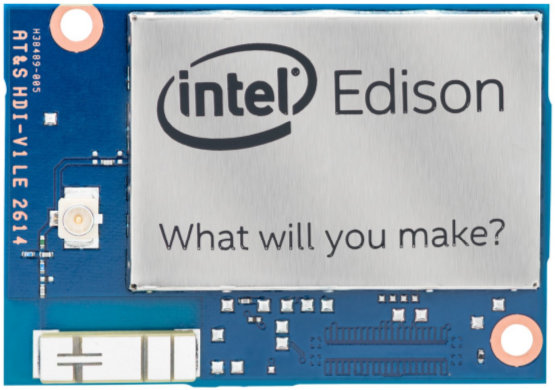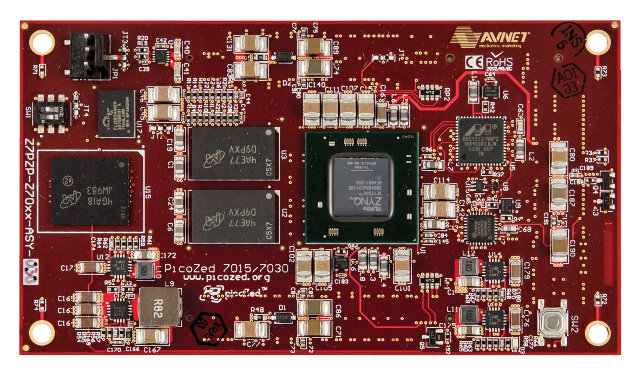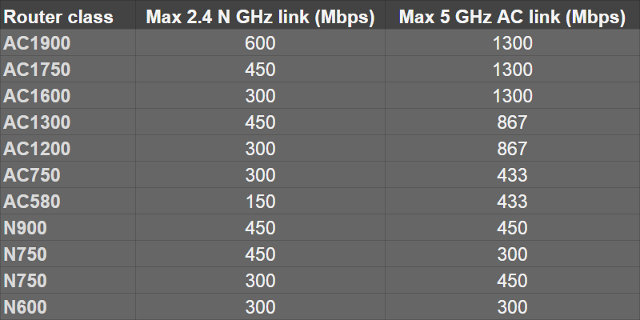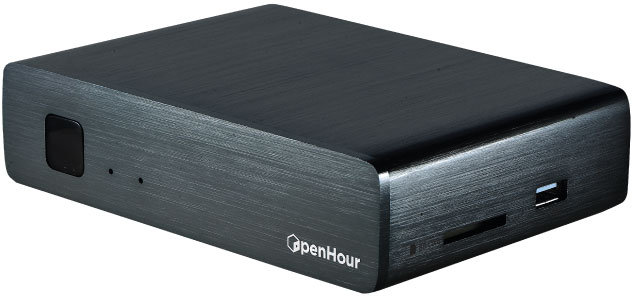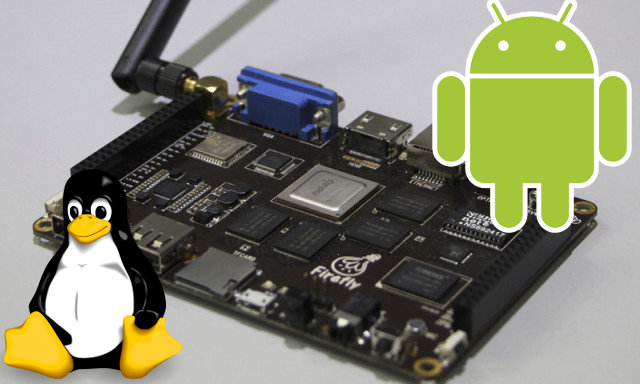Intel announced the Edison board for wearables applications last January at CES 2014. When it first came out, it looked like an SD card, but the board look has now drastically changed. Nevertheless, the important point is that Intel Edison is now available, together with various development kits, and runs Linux (Yocto built), as well as an RTOS. With the official release, we’ve also got the full specifications: SoC – Dual-core, dual-threaded Intel Atom (Silvermont) processor (22nm) processor @ 500 MHz and a 32-bit Intel Quark micro-controller @ 100 MHz. Includes 1GB LPDDR3 PoP memory System Memory – 1 GB LPDDR3 (PoP memory) – 2 channel 32bits @ 800MT/sec Storage – 4 GB eMMC (v4.51 spec) + micro SD card connector Connectivity – Dual band 802.11 a/b/g/n Wi-Fi (Broadcom 43340) with either an on-board antenna or external antenna, and Bluetooth 4.0 USB – 1x micro USB connector I/Os: 2x UART […]
PicoZed System-on-Modules are Powered by Xilinx Zynq-7000 ARM + FPGA SoC
After the Zedboard, and the Microzed, here comes PicoZed, a family of system-on-modules (SoM) based on Xilinx Zynq-7000 SoCs featuring a dual core Cortex A9 processor and FPGA fabric. The module also comes with 1GB RAM, 4GB eMMC, Gigabit Ethernet PHY, various user I/O, and more. Target applications include embedded vision, test & measurement, motor control, software-defined radio, and industrial automation. Four modules are available with support for commercial or industrial temperature ranges, all sharing the following specifications: SoC (depending on module) Xilinx Zynq-7010 with two Cortex-A9 cores @ 866MHz, FPGA with 28K Logic Cells Xilinx Zynq-7015 with two Cortex-A9 cores @ 866MHz, FPGA with 74K Logic Cells, 4 transceivers @ 6.25 Gb/s Xilinx Zynq-7020 with two Cortex-A9 cores @ 866MHz, FPGA with 85K Logic Cells Xilinx Zynq-7030 with two Cortex-A9 cores @ 1GHz, FPGA with 125K Logic Cells, up to 4 transceivers @ 12.5 Gb/s System Memory – 1GB […]
iControlHub is An Upcoming XBMC Media Center Powered by Intel Celeron J1900 Processor
Earlier this week, we’ve seen MINIX NEO Z64 mini PC based on Intel Atom Z3735F that will sell for less than $150 in October. If you’d like a low power low cost Intel based fanless mini PC but with a bit more processing power, iControlHub could be an option with an Intel Celeron J1900 Bay Trail quad core processor. Preliminary specifications for iControlHub: SoC – Intel Celeron J1900 processor @ 2.0 GHz (Burst frequency 2.41 GHz) with Intel HD graphics (Max TDP) System Memory – Up to 8GB DDR3 Storage – HDD / SSD via mSATA connector Video Output – HDMI Audio Output – HDMI, optical S/PDIF Connectivity – Gigabit Ethernet, Wi-Fi with two external antennas USB – 2x USB 2.0 host ports, 1x USB 3.0 host port Misc – IR in and out Power Supply – 12V Dimensions – 125 x 125 mm (Board) You must be confused with […]
Xiaomi Mi Wi-Fi Mini 802.11ac Router Can Now Be Purchased for $45
Ever since TV boxes with 802.11ac capabilities have been listed, I’ve been looking at purchasing a router with the latest Wi-Fi standard since I would then be able to test 802.11n at 2.4 and 5 GHz, as well as 802.11ac. The vast range of prices got me confused at first, but an article on Connectedly helped me clear things out. One of the most important factor is the different classes of Wi-Fi routers as shown in the table below. The class nomeclature is based on the Wi-Fi standard (AC or N) with a number corresponding to the rounded sum of the maximum throughput at 2.4GHz and 5GHz. Based on this table, and my limited budget ($100), I decided to look for AC1200 or greater routers, and I found one for TP-LINK Archer C7 AC1750 router selling for $100 on Amazon. Awesome! So I went to look on local websites only […]
Cloud Media OpenHour Chameleon Quad Core TV Box Boots Android or Linux from SD Card
Cloud Media, previously known as Syabas, has been selling Popcorn Hour media players based on Linux for several years, but with OpenHour Chameleon the company is about to launch their first Android media player powered by Rockchip RK3288. The device is similar to other RK3288 TV boxes, except it does not come with internal storage at all, and instead boots Android 4.4.2 from a provided 8GB SD card, with later plans to have support for Linux operating systems such as Ubuntu. Another particularity is that they’ll use an aluminum casing for better heat dissipation of the Rockchip RK3288 processor which can get pretty hot… OpenHour Chameleon specifications: SoC – Rockchip RK3288 quad core ARM Cortex A12 / A17 processor with ARM Mali-T764 quad-core 3D GPU supporting OpenGL ES 1.1/2.0/3.0, and OpenCL 1.1 System Memory – 2GB DDR3 Storage – No Internal storage + SD card slot with 8GB card (including […]
Rockchip RK3288 Android 4.4.2 SDK and Schematics Released for Firefly Board
Firefly-RK3288 development board was first announced in July. I still don’t have news about availability nor pricing, but the T-Firefly website launched yesterday. They seem do have a nice Wiki, but unfortunately everything is currently in Chinese, except when you go to the download page. You’ll find firmware upgrade_tool for Linux and Windows, the USB drivers for rooting and firmware update, firmware images (Android 4.4.2, Ubuntu 14.04, and dual boot), the board schematics (PDF), and Android KitKat 4.4.2 SDK with U-Boot, Linux, and Android source code, some documentation, XBMC apk (no source) with H.265 hardware decode support for MP4, MOV and MKV container formats. The SDK is available on Bitbucket. I planned to test it, but unfortunately my network connection is very slow (and unstable) to this server, and I failed to retrieve it with git clone. The company also posted the build instructions in Chinese in their website, but […]
Linaro 14.08 Release with Kernel 3.16 and Android 4.4.4
I’m a little late for that one, as Linaro 14.08 was released last Thursday. Nevertheless, this release features Linux kernel 3.16 (baseline), Linux 3.10.52 (LSK), and Android 4.4.4. As usual Linaro has worked on member hardware such as Qualcomm based IFC6410 and ARM Juno &Vexpress boards. They’ve also committed changes for LLVM, big Endian, and added a workload generator tool (rt-app) to the Ubuntu and Android image. This tool has been developed and used by the power management working group, presumably to measure and optimize power consumption under various loads. Here are the highlights of this release: Linux Linaro 3.16-2014.08 GATOR version 5.19 (new version) updated topic from Qualcomm LT (ifc6410 board support) updated Versatile Express ARM64 support (FVP Base and Foundation models, Juno) from ARM LT (Landing Team) updated Versatile Express patches from ARM LT updated LLVM topic (follows the community llvmlinux-latest branch) Big endian support (the 2014.05 topic […]
New Optimized Web Browser Released for the Raspberry Pi
If you’ve ever tried to use a Raspberry Pi to browse the web, you must have noticed how frustrating it can be due to the overall sluggishness of the system. But thanks to work by Collaborra, which optimized Epiphany Web browser for the Raspberry Pi, bringing features such as 720p HTML5 hardware video decoding (no flash support), faster loading and scrolling, etc.., the web browsing experience has much improved, although as you’ll see from the video below, it’s still not quite 100% perfect. The key modifications brought to Epiphany Web browser are listed below: More responsive UI and scrolling, even while loading a page Progressive tiled rendering for smoother scrolling Startup is three times faster Avoid useless image format conversions Better YouTube support, including on-demand load of embedded YouTube videos to make page load much faster Hardware decoding and scaling of videos (through gst-omx) Reduction of the number of memory […]


